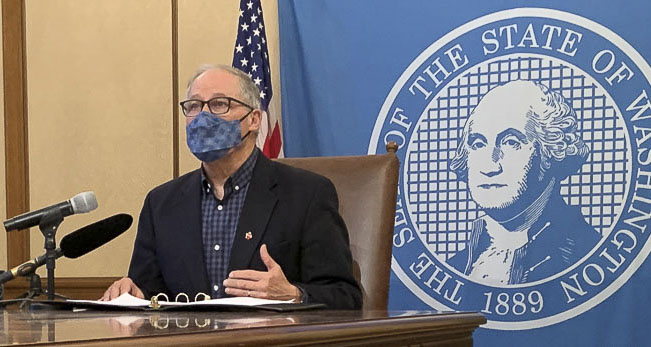
Jason Mercier of the Washington Policy Center shares that our system of governance is not meant to be the arbitrary rule of one behind closed doors
Jason Mercier
Washington Policy Center
A total of 975 days later, the Governor’s emergency orders related to COVID-19 are finally ending after today. Now begins the next steps for legislative reforms and a court date before the state Supreme Court. The state Supreme Court announced last month that it has agreed to hear a case challenging the authority for the Governor’s emergency powers, as well as reviewing if some of his prior orders violated Washington’s constitutional protections for contracts. The case is Gonzales, et al. v. Jay Inslee & State of Wash. According to a press release for the Washington Business Properties Association:
“In the Gonzalez case, the Washington Business Properties Association argues that emergency proclamations issued by Inslee during the height of the COVID-19 pandemic eroded basic constitutional rights. The suit’s main points are that the governor lacks the authority to issue Proclamation 20-19 through 20-19.4, and they:
- Create a ‘Delegation’ and ‘Separation of Powers’ issue;
- Interfere with the power of the judiciary and rights to petition for redress of grievances;
- Violate the Takings Clause of the state Constitution; and
- Impairs contracts;
‘What the state demanded of housing providers is unprecedented and out of step with what other industries had to deal with. Tenants and providers entered into contracts that exchange housing for compensation, but the governor’s proclamations unduly interfered with those agreements. Grocery stores were not forced to provide food to people for free or with the vague idea that they might get paid at some point in future.’”
The state Supreme Court has scheduled oral arguments on this case for February 23, 2023.
In the meantime, when the legislature next convenes it should ensure that this type of ongoing emergency governance without affirmative legislative approval never happens again. Whether or not you agree or disagree with every decision the Governor has made for the last 975 days, the fact remains these decisions with vast impact on individuals and businesses were made behind closed doors in the executive branch.
It is true that in an emergency, governors need broad powers to act fast. Legislative bodies inevitably take longer to assemble and act than a single executive, so they temporarily delegate their power to the executive in emergencies. But these powers are supposed to be transferred for a limited period of time with meaningful legislative oversight of the decisions made.
Long-lasting emergency orders should receive the input and affirmative approval of lawmakers following a public process, allowing the perfection of policies through a collaborative weighing of all the options, alternatives and tradeoffs. This is precisely why the people’s legislative branch of government exists – to deliberate and provide guidance to the executive branch on what policies should be in place and how to implement them.
There is a very simple fix the legislature should make next session to restore balance to the state’s emergency powers framework. Harmonizing the existing law so that both waiving of statute and restrictive proclamations expire after 30 days unless the legislature votes to continue should not be controversial. There is no logical reason to treat those emergency actions by the Governor differently.
Requiring affirmative legislative approval after a set point in time removes not a single tool from the Governor’s toolbox. All existing authority remains, the only change is that the closed-door policymaking is required to be justified to the people’s legislative branch of government to continue a policy (i.e., the separations of power and checks and balances envisioned and promised under our republican form of government).
The Governor should not fear being required to make the case to lawmakers why a particular emergency restriction is appropriate to continue, and the legislature should not hide from its constitutional responsibility to debate and adopt policy. At some point the executive branch should be required to receive permission from the legislative branch to continue making far-reaching policies under an emergency order.
Our system of governance is not meant to be the arbitrary rule of one behind closed doors. An emergency order should never last for nearly 1,000 days unless it has received affirmative authorization for continuation by the legislative branch of government. The legislature must still act to restore the balance of powers for future use of emergency orders.
Jason Mercier is the director of the Center for Government Reform at the Washington Policy Center.
Also read:
- Opinion: Schools notifying parents about the kinds of care kids can decide on their own didn’t make itElizabeth New criticizes the removal of Amendment 1164 from current legislation, arguing it leaves parents uninformed about health care services accessed by their children through schools.
- Opinion: Off-road vehicles in the neighborhoodDoug Dahl responds to a resident’s concern about off-road vehicles on neighborhood streets, outlining the legal violations and safety risks involved.
- POLL: Is America more united or more divided than it was a decade ago?Clark County Today’s weekly poll asks: Is America more united or more divided today? The question comes after Stephen Davis brought a powerful message to Vancouver.
- Opinion: Revolution or revival?Nancy Churchill argues that Washington state is ground zero for a Marxist-style revolution but says a cultural revival is possible through personal responsibility and the America First movement.
- Letter: ‘It’s said sarcasm is the lowest form of wit’Amboy resident Thomas Schenk criticizes Olympia’s use of “emergency clauses” and other legislative tactics that limit public participation.










